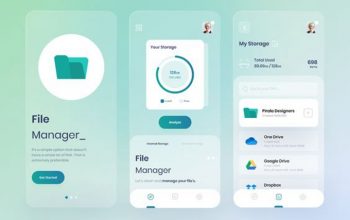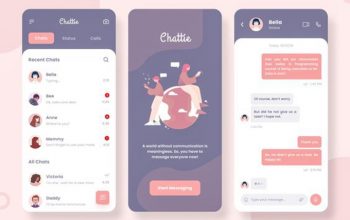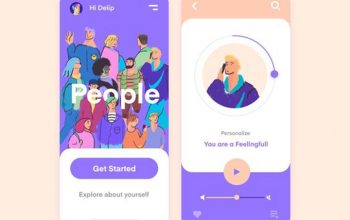Over the flip of the last decade, cell functions remodeled from being primarily employed solely as promotional instruments to enterprise avenues for reaping sustainable revenue. The increment of mobile-app builders, alongside that of smartphone utilization, has drastically modified conventional enterprise fashions. A testomony to that is the truth that in 2018, 95% of all apps commercialized within the Google Play Retailer had been free.
Table of Content
Quick ahead, by March 2021, Statista reported that 96.7% of cell functions within the Google Play retailer had been freely out there, whereas 92.9% of iOS functions had been free. That being stated, a typical query many spectators and fans ask is, ‘how do free apps earn a living?’ Particularly with the statistical proof that ‘free’ is the route for a lot of builders and enterprises.
What are Free Apps?
Within the easiest sense, free cell apps are functions that don’t incur any price to obtain from a cell app retailer. Such apps usually tackle totally different monetization methods, such because the generally recognized freemium.
The freemium adopters (combining “free” and “premium”) primarily earn from in-app purchases, providing customers extra features or upgrades for full content material and providers, and even the elimination of pop-up ads.
This mannequin is prevalent in cell sport apps because it revolves round incentivizing customers to pay additional to reinforce their expertise. Moreover, the freemium mannequin permits customers to strive an app earlier than they pay for something, thus growing a developer’s probabilities of producing income. For instance, the three top-grossing freemium video games— PUG Cellular, Honor of Kings, and Pokemon Go—reported whole earnings of over US$6.5 billion.
The highest cell video games app by worldwide income as of February 2021. Picture Credit score: sensortower.com
One other instance is Slack, a communication software that facilitates data sharing inside workspaces to get work carried out. Slack employs a traditional freemium strategy the place its free model permits customers to make the most of its core functionalities, whereas its paid model delivers extra upgrades like full messaging historical past entry, limitless integrations, and display sharing.
How A lot Cash Do Free Apps Make?
In keeping with Statista, the cell utility market income will peak at $935 billion by 2023. These numbers lend credibility to apps being a worthwhile area of interest.
In keeping with the newest statistical baseline, 25% of the highest iOS builders and 16% of the main Android builders make as much as $5,000 monthly with their free apps. This principally implies that roughly 20% of the cell apps in the marketplace deliver a revenue based mostly on their prime quality.
How Do Free Apps Make Cash?
Free apps earn a living in varied ways in which we will element beneath with a couple of case research. Let’s delve in, we could?
In-App Promoting
With this strategy, app house owners generate income by displaying third-party advertisements inside their cell functions. Principally, app house owners deal with incomes revenue from advertisers as the worldwide spending on cell promoting is predicted to succeed in $240 billion.
Moreover, on this mannequin, app builders may also cost the customers a small sum of cash in the event that they want to block ads, for instance, YouTube and Spotify.
In-App Purchases
This medium of making a living revolves across the cell app being free whereas permitting customers to buy varied digital items resembling extra app options, customization choices, in-game forex, power-ups to additional content material, or new ranges.
Regardless of the few customers(roughly 5%) who make in-app purchases, In-app purchases make up about 47% of the overall income generated from apps globally. Nevertheless, many analysts predict that the promoting income mannequin will quickly dwarf it.
The great thing about this mannequin is customers can ‘Purchase as soon as, maintain ceaselessly’ their options, items, and content material. Which means that bought digital objects and content material by no means expires, as an illustration, additional lives in a sport or in-app forex that may be spent on different premium options.
A case examine instance is Sweet Crush. Having made roughly $1.19 billion in income (with $473 million generated within the USA between January and September) and sustaining over 300 million energetic customers, Sweet Crush Saga applies in-app purchases to one of the best impact. With its informal gameplay, customers are simply enticed to make small in-app purchases that accumulate over time. In keeping with Sensor Tower, Sweet Crush gamers spend almost $4.2 million per day on the Google and Apple App Shops.
Knowledge Licensing
Some free apps with an enormous variety of energetic customers accumulate data on their conduct and promote the info in an anonymized format to 3rd events like advertisers and analytics firms. In essence, the extra day by day energetic customers an app has, the extra correct, pertinent, and invaluable that knowledge is for knowledge collectors.
However, most apps that make the most of this monetization strategy ask for a number of permissions to take advantage of and entry customers’ private knowledge. Such app builders usually work with monetization companions keen to abide by all the privateness and safety legal guidelines. That is necessary as rules pertaining to person knowledge are stringent, with extreme penalties for breaking them. For instance, the GDPR in Europe which imposes a most high-quality of €20 million (roughly £18 million) for breaking knowledge privateness guidelines.
Subscriptions
This mannequin is much like in-app purchases because it permits customers to purchase extra digital items, content material, and options. Nevertheless, as a substitute of availing them the choice to purchase at any time when they need, this monetization mannequin institutes ‘subscription durations’.
These subscription durations are available in two varieties. Non-renewing subscriptions, the place customers pay for one subscription interval at a time, and auto-renewing subscriptions, the place subscriptions are robotically renewed after every subsequent subscription interval.
Free apps often obtain success with this mannequin by offering customers with a relentless stream of recent and invaluable content material and providers. This strategy is usually adopted by service-oriented or very content-centric apps that encourage frequent and repeated utilization.
An instance is Headspace, a meditation app that teaches customers the way to breathe and meditate. Headspace provides customers a two-week free trial, then consequently prompts customers to subscribe to get entry to a whole library with tons of of guided meditations, mindfulness coaching, and respiratory workouts.
Sponsorships
With this strategy, manufacturers and businesses pay to have an unique spot inside a free app. In observe, such manufacturers can present related rewards to the app’s customers after they carry out particular in-app actions. In flip, the app proprietor earns cash by taking a share of the income from redeemed rewards.
This is a superb means free of charge apps to generate income from promoting, nonetheless, with out lowering the appliance’s person expertise. By immediately collaborating with particular manufacturers, app house owners management the kind of promotional content material displayed inside their utility, making certain it’s related to their goal group. On the identical time, they will additionally create model activations which can be inventive, participating, and fascinating for his or her customers whereas nonetheless making a living.
For instance, Runkeeper, a preferred GPS fitness-tracking app with greater than 50 million customers, allows its customers to hitch a operating neighborhood, observe workouts, set objectives, and observe their progress. As an early adopter of the sponsorship mannequin, Runkeeper retains offering its customers with unique rewards from well being and health manufacturers in the event that they full predetermined in-app actions and actions.
Affiliate or Referral Advertising and marketing
Linked to in-app promoting, many free app builders additionally exploit referral/affiliate to advertise third-party services or products. Thus, making cumulative commissions from the third events. For instance, Amazon Associates internet affiliate marketing program permits app builders to monetize apps. In observe, app house owners can promote any Amazon product by inserting hyperlinks to them. And if a person clicks the hyperlink and makes a purchase order, the app proprietor receives a reward.
Micro-transactions
Associated to in-app purchases and extensively in style in online game apps, micro-transactions permit free app builders to allow customers to buy digital objects for small sums of cash. For instance, gamers should purchase premium objects like in-game objects, character costumes, weapons, and so on.
For example, the cell sport “League of Legends” advantages rather a lot from microtransactions. Performed by tens of millions of individuals worldwide, League of legends generated $1.75 Billion, with a lot of the income from microtransactions. For instance, the cell sport permits for the acquisition of Riot Factors, an in-game forex that may be utilized to purchase skins (totally different aesthetic decisions for in-game characters), to unlock characters, or for prolonged gameplay.
Honorable Mentions
Some free app builders cost transaction charges to earn a living if their cell app belongs to a market phase the place customers transact cash. This strategy is frequent with e-commerce apps, meal ordering apps, flight, and lodge reserving apps, and Canine strolling apps.
What Do Customers Look for in Free Apps?
- Comfort: Free Apps that simplify day by day life by offering comforts like alarms, maps, restaurant looking out, and weather-checking have a tendency to make more cash.
- Communication: Free apps that facilitate communication between family and friends, resembling prompt messaging apps, all the time earn a living someway.
- Social networking: People want a way of belonging and acceptance inside their social teams. That being stated, free apps for social and enterprise networking are likely to generate extra enterprise alternatives for the house owners, particularly if visitors soars. As such, app house owners can simply apply knowledge licensing, promoting, or affiliate fashions.
- Worth expression: Free apps that permit customers to precise their private values and improve their self-concepts are additionally worthwhile. Such apps present value-expression advantages by tapping into customers in search of to earn social recognition via, for instance, picture and video-sharing apps.
- Leisure: Lastly, free apps that present leisure will all the time be bankable. For example, gaming and music-streaming apps.
Closing Remarks
All issues thought-about, the method of making a living from free apps revolves round person engagement and constructing belief whereas offering worth and high quality with out really requiring customers to spend cash. That’s the essential precept, in all honesty.
Most free app builders purpose to seek out the candy spot between giving customers too many or too few options, with a objective to incentivize them to spend later. That being stated, most free apps which can be extremely worthwhile mix totally different monetization methods – for instance, in-app purchases and subscriptions, or internet affiliate marketing and subscriptions.




